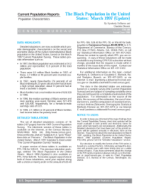The Black Population in the United States: March 1997 (Update)
The Black Population in the United States: March 1997 (Update)

Detailed tabulations are now available which pro-vide demographic characteristics on the social and economic status of the civilian noninstitutional Black population in the United States, based on the March 1997 Current Population Survey. These tables provide information such as:
- In 1997, the Black population was estimated at 34.2 million and represented 12.8 percent of the total population.
- There were 8.5 million Black families in 1997; of these, 3.7 million or 46 percent were married-couple families.
- In 1997, nearly three-fourths (74 percent) of all Black individuals 25 years old and over had at least a high school education; about 14 percent had at least a bachelor’s degree.
- Black families had a real median income of $26,520 in 1996.
- In 1996, the median earnings of Black women and men working year-round, full-time were $21,470 and $26,400, respectively, for a female-to-male earnings ratio of 0.81.
- In 1996, 2.1 million or 26 percent of Black families had income below the poverty level
These tables present data on the demographic, social, and economic characteristics of the Black population in the United States from the March 1997 supplement to the Current Population Survey (CPS). Topics covered include geographic distribution, marital status, educational attainment, family and household type, labor force status, occupational distribution, earnings, family income, and poverty status. Data are presented for the United States, the South, and the combined North and West regions. Tables 1-15 provide data comparing the Black population to the non-Hispanic White population. A summary table, Table 16, presents data on selected social and economic characteristics of the White population.
NOTE: Percentages are rounded to the nearest tenth of a percent; therefore, the percentages in a distribution do not always add to exactly 100 percent. The totals, however, are always shown as 100. Moreover, individual figures are rounded to the nearest thousand without being adjusted to group totals, which are independently rounded; percentages are based on the unrounded numbers.
Symbols Used in Tables
- - = Represents zero or rounds to zero.
- X = Not applicable
- NA = Not available
- (S) = Median earnings and standard errors are not shown when the base is less than or equal to 5,000 persons
Source and Accuracy of Estimates
The data shown here (in these tables) are from the March 1997 Current Population Survey. All survey data are subject to sampling variability as well as survey design flaws, respondent classification errors, and data processing mistakes. The Census Bureau has taken steps to minimize errors, and analytical statements have been tested and meet statistical standards. However, because of methodological differences, use caution when comparing these data with data from other sources.
Tables
Others in Series
Publication
Publication
Publication






